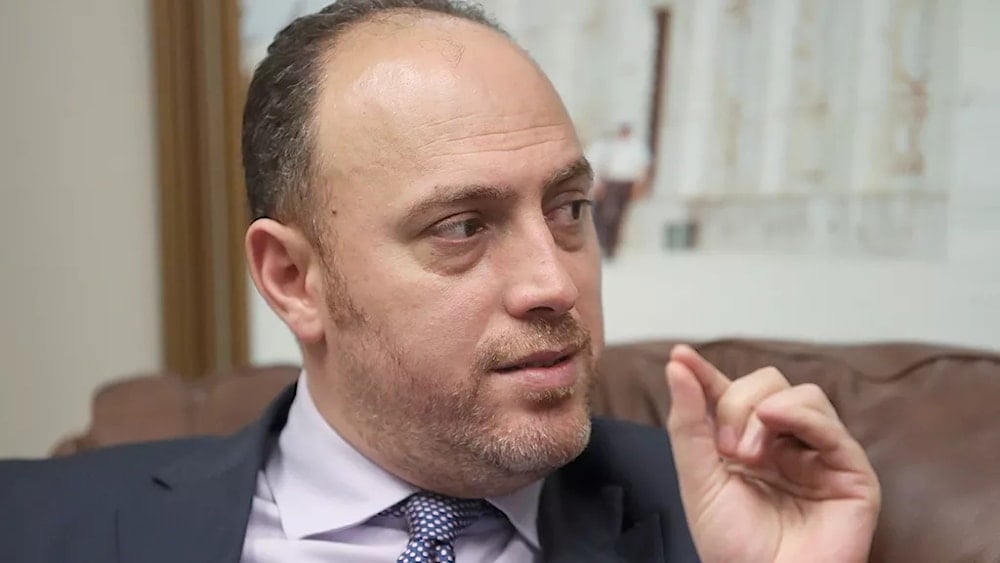Recognize Palestine to end 'deadly status quo', UK envoy urges
Palestinian ambassador Husam Zomlot calls on the UK to recognize Palestine before the UN "two-state" conference, warning that any delay only reinforces the "deadly status quo."
-

Palestinian Ambassador to the UK, Husam Zomlot, appears in this undated photo (AP)
In an op-ed published by The Guardian, Palestinian ambassador to the UK, Husam Zomlot, urged the Labour government to formally recognize the State of Palestine ahead of a high-level United Nations conference on the "two-state" solution set to begin in New York on June 17.
Zomlot warned that continuing to delay recognition only entrenches the “deadly status quo” and risks aligning the UK with what he described as an "apartheid regime".
“Recognition is neither a reward for one party nor a punishment for another,” Zomlot wrote. “It is a long-overdue affirmation of the Palestinian people’s unconditional right to exist and live freely in our homeland.”
He emphasized that the recognition of Palestine should not be made conditional and called on the UK to fulfill its longstanding manifesto commitment, especially with Labour now in power, according to The Guardian.
The UK, alongside France and Canada, is among the G7 states reportedly considering formal recognition of a Palestinian state. The upcoming conference in New York, co-sponsored by France, aims to revive the pathway toward a "two-state solution", a concept allegedly once supported by "Israel" but which no longer features in the official Israeli rhetoric.
According to The Guardian, British Middle East Minister Hamish Falconer came under heavy pressure this week from MPs across party lines in the House of Commons, with calls mounting for the UK to recognize Palestine unconditionally before the UN gathering.
While Falconer appeared sympathetic in private discussions, the final decision rests with Prime Minister Keir Starmer.
As reported by The Guardian, diplomats remain divided over whether recognition should be granted immediately or made subject to a timeline with conditions. Meanwhile, France and the UK are holding intensive discussions to agree on a unified stance.
Abbas pledges reform, calls for Hamas to relinquish arms
In a four-page letter made public by the French presidency, Palestinian Authority (PA) President Mahmoud Abbas pledged to hold internationally supervised elections within a year and committed to major reforms.
The letter also included unprecedented declarations that Hamas would no longer govern Gaza and must disarm, transferring military control to Palestinian security forces with international and Arab backing.
French President Emmanuel Macron welcomed the letter as a hopeful step. However, according to The Guardian, doubts remain among Gulf and European officials about whether Hamas will fully cooperate.
One senior Gulf diplomat confirmed Hamas had agreed not to seek political control of Gaza but added that disarmament terms and the group’s future leadership remain unresolved.
As recognition of Palestine becomes a key element of diplomatic maneuvering, some European and Gulf officials argue that UK and French recognition could serve as leverage to push the PA toward long-overdue political reforms. Yet others, including analysts from the European Council on Foreign Relations, caution that recognition alone offers little influence over Hamas, which remains skeptical of disarmament without a broader peace agreement.
“The delay in recognition simply reinforces the deadly status quo,” Zomlot wrote in his op-ed to The Guardian, adding that conditioning recognition on "Israel's" consent effectively grants the occupation regime a permanent veto over Palestinian self-determination.
Diplomatic realignment distances Europe from US stance
While the United States has dismissed the upcoming UN conference as counterproductive and called for a boycott, European nations appear increasingly willing to chart an independent course.
A senior diplomat noted that fears of backlash from the Trump administration are waning, as the transatlantic divide on "Israel" deepens, according to The Guardian.
The newly appointed US ambassador to "Israel", Mike Huckabee, recently stated that he no longer considers a "two-state solution" viable, further undermining Washington's influence on European policy.
As preparations for the conference continue, countries such as Qatar, Mexico, and Brazil are playing prominent roles in shaping the agenda, including working groups focused on reducing incitement and promoting a shared peace narrative.
For many involved, formal recognition of Palestine by major Western states represents a tangible step toward ending the current impasse.
We thank President Macron for his strong support for the Palestinian vision: a political solution rooted in justice and international law. As President Abbas says, “We can live in peace and security tomorrow if we make the right decisions today.” This must begin by an immediate… https://t.co/GfSRFoxMjF
— Husam Zomlot (@hzomlot) June 12, 2025

 4 Min Read
4 Min Read








